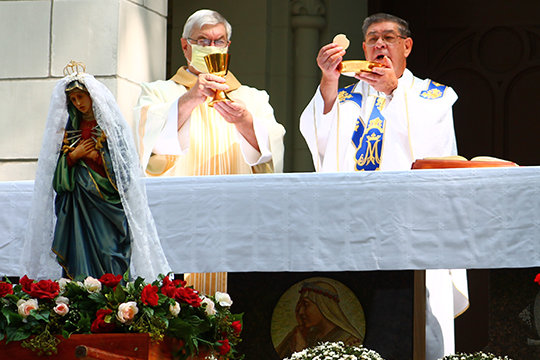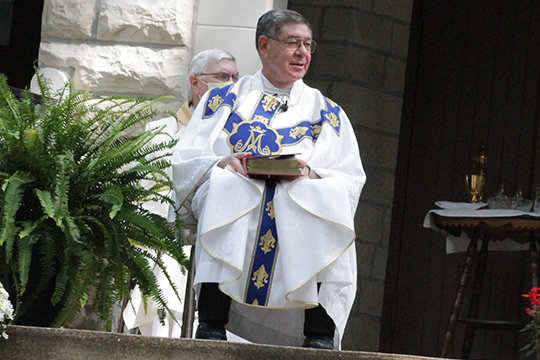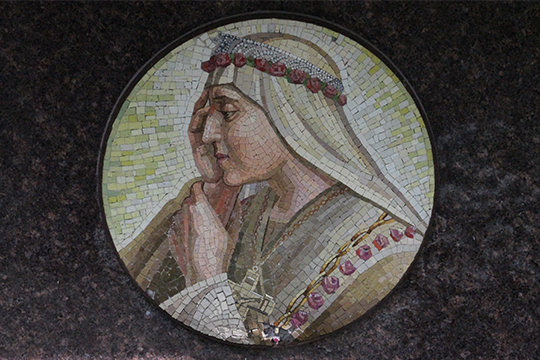J.C. native Fr. Meyer notes 50 years as a La Salette priest

CLICK HERE for a gallery of photos from the Fall Pilgrimage to the Shrine of Our Lady of Sorrows.
The Blessed Mother no longer weeps for her Son, Who suffered and died before her eyes but was raised up and now lives forever.
Instead, her tears now flow for so many of her adopted sons and daughters who have turned away from God and from one another.
“She spoke to the children at La Salette about reconciliation, about turning back to God, about realizing the place of Jesus in their lives,” said Father Dennis Meyer, who is celebrating his 50th anniversary as a priest of the Missionaries of Our Lady of La Salette.
“Today, perhaps more than ever, there is that need, and Mary continues to call us back to devotion to her Son,” he said.
Fr. Meyer, who grew up in Jefferson City and attended the old La Salette high school seminary near Helias Catholic High School, celebrated Mass at this year’s Fall Pilgrimage to the Shrine of Our Lady of Sorrows in Starkenburg.
He did so at the shrine’s outdoor altar, which was originally built for the former La Salette Seminary chapel.
“I’ve never offered Mass on it as a priest before, but it’s a very familiar sight to me from early in my formation,” he stated.
So are the rolling hills and bluffs of the Missouri River Valley. Fr. Meyer spent the first six years of his life in Washington, Missouri, and the next 12 in Jefferson City, with time visiting relatives in Westphalia and Freeburg.
“No matter where else you minister or how long you minister in other places, there’s just no place like home, and you always feel that,” he said.
Raised in community
“It’s very hard for me to imagine being outside the Catholic atmosphere,” said Fr. Meyer. “And not just the doctrinal aspect but also the social and communitarian aspects.”
His mother grew up in Freeburg, while his father grew up in Washington. Both were small, tight-knight communities.
“So our family life was very, very tight,” said Fr. Meyer. “My mom and dad were very much about fostering family life.”
That communal Catholic “way of being” helped shape the Meyers’ four children — Fr. Meyer and his three sisters.
“In all of those little communities, the Church at that time was the center of community and even social life,” said Fr. Meyer. “I remember hearing how whole towns would gather for baptisms, weddings and funerals.”
There were priests and sisters among the relatives on both sides of his family.
He grew up respecting and admiring Monsignor Joseph Vogelweid PA, longtime pastor of St. Peter parish, and the procession of young associate pastors who ministered with him.
“They were really exemplary people,” Fr. Meyer recalled. “They are part of what attracted me toward the Priesthood.”
After the family moved to Jefferson City, La Salette Father Bill Crane hired Fr. Meyer’s mother to work at the newly established La Salette Seminary — first doing laundry for the priests, then as a cook for the priests and seminarians.
This afforded young Dennis many opportunities to interact with La Salette priests and hear stories about the seminarians.
He briefly considered joining the Oblates of Mary Immaculate and attending their high school seminary in Carthage.
“But of course, the proximity of the high school in Jefferson City the familiarity I had with it and the fact that Mom worked there all figured into my decision to enter La Salette,” he said.
So at age 14, after graduating from St. Peter School, Fr. Meyer forsook a scholarship to Helias Catholic High School and embarked on priestly and religious formation.
His mother soon discerned that the seminary wasn’t big enough for both of them.
“Mom was a person who believed once you got to a certain point, you’d be independent,” Fr. Meyer recalled. “Priests would come down to the kitchen and tell her stories about my behavior. And she basically told them that I was their problem now!”
A time of transition
Seminary life stood on the granite pillars of faith and discipline.
“It was a very religious atmosphere,” Fr. Meyer recalled. “We had Mass every day — two on Sunday, a Low Mass and a High Mass.”
All the seminarians wore cassocks and surplices to Mass.
The young men seldom left the seminary’s idyllic property or had contact with people beyond its periphery.
“I think we had one visiting Sunday a month where we could go home until five if your family lived nearby,” Fr. Meyer recalled. “And once every month or so, we got to walk into town — usually to Central Dairy for ice cream.”
La Salette Father Clarence Wheeler, who later served as a chaplain at the old Missouri State Penitentiary and then at the Discalced Carmelite Monastery in Jefferson City, taught algebra when Fr. Meyer was a senior.
“By that time, there were 13 of us in the class, so it was really like having a personal tutor for all of your classes,” said Fr. Meyer.
From there, he moved on to the La Salette junior college in Altamont, New York. He then went to Pontifical Gregorian University in Rome, studying philosophy with seminarians from all over the world.
He studied theology at The Catholic University of America in Washington, D.C.
“We went from years of almost total sequestration to an open campus,” he said. “That was a bit of a shock.”
The Second Vatican Council had concluded the previous year, and his instructors were opening up to the new worldview it presented.
“We got quite an intriguing mix of old theology and new theology,” he said. “It was an interesting time.”
Each summer, the La Salette seminarians had to meet with the pastor of their home parish.
“And of course, you went with great fear and trepidation,” Fr. Meyer recalled. “But at the same time, Msgr. Vogelweid had a great sense of ministry and his enthusiasm quickly put you at ease.”
Called to reconciliation
Fr. Meyer professed vows in 1963, solemnly pledging to spend the rest of his life in poverty, charity and holy obedience, in keeping with the constitutions of the La Salette Missionaries.
On June 6, 1970, in the Cathedral of St. Joseph in Jefferson City, Bishop Michael F. McAuliffe of Jefferson City, now deceased, ordained him to the Holy Priesthood.
The purpose of the La Salette Missionaries is to help reconcile people with God and with one another.
Diocesan priests from Grenoble, France, founded the congregation in 1852 in response to apparitions of the Blessed Mother that had taken place there in 1846.
Many of the people there were poor and uneducated and had become lax in their faith.
Jesus’s mother appeared to a group of children who were tending sheep. She moved her hands from her face to reveal that she was crying.
In words the children could understand, she told them how much sorrow she felt for people having fallen out of touch with her Son Jesus.
She wanted them to return to the practice of their faith and the joy that comes with it.
“Make this known to all my people,” she told them.
People began making pilgrimages to the site of the apparitions. The priests who ministered there became devoted to spreading her message of returning to God through Jesus.
Eventually setting up a U.S. province, the La Salette Missionaries did mission work in isolated portions of the country, as well as in Argentina, Burma and Madagascar.
Fr. Meyer shared the excitement of the overseas missionaries whenever they returned to talk about their experiences.
“They certainly helped expand my understanding of what it means to be the Church and certainly of what it means to be on mission,” he recalled.
But he never felt called to serve in a foreign mission.
Instead, he spent most of the past 50 years ministering in parishes and helping seminarians discern and prepare for Priesthood.
He started out teaching high school at St. Henry Seminary in Belleville, Illinois, which the La Salette seminarians attended after their Jefferson City seminary closed.
He has always lived with other priests and brothers.
“For me, the religious life and the aspect of close community is an important element to me being a priest,” he said.
He served at the La Salette novitiate in Connecticut for a few years, followed by ministering in a parish in Louisiana before moving back into formation work.
He ministered at a suburban parish near Detroit for five years before serving as leader of the congregation’s Midwest province.
In those six years, he worked to bridge two distinct generations within the congregation, regularly spending weekends at places throughout the province where La Salette Fathers were serving.
Restored sense of mission
“When I grew up and went into the community, ‘mission’ was almost universally understood as referring to the foreign missions,” Fr. Meyer recalled.
“But with the Vatican II understanding of the Church as the People of God comes the realization that we are all on mission together,” he said.
Every Catholic has a role, a distinct way of carrying out Christ’s mission and building up the People of God.
“Some are called to do this in a more expanded or concentrated way, but we are all called to be a part of the whole mission Church,” said Fr. Meyer.
What was once seen as bringing Christ to people who lack His presence is now seen as recognizing His presence within them.
“A good deal of ministry is drawing the story out of people and helping them put it into context,” said Fr. Meyer. “That kernel of faith is there, but they don’t have a context to fully fit it into.
“Christianity provides that true context.”
Priests and religious have an important role to play in that process, but not the only role.
“It’s taken several generations to dispel the understanding that the priest has to do everything,” he said. It takes time to develop that ecclesiology that everyone is responsible for the Body of Christ.”
With that understanding comes renewed trust that God is hard at work among His people.
“The Church is so much bigger and more enduring than any of us,” said Fr. Meyer. “I think that flavors my whole attitude toward ministry.”
Gratefully looking ahead
Now in semi-retirement, Fr. Meyer lives in community with six other La Salette priests in St. Louis, who concelebrate Mass and pray Morning Prayer and Evening Prayer together each day.
They were also offering chaplain services to local convents and filling-in for local priests on weekends until this February.
“The COVID seclusion has cut off a lot of ministerial opportunities,” he said. “But we still find things to do.”
He looks forward to continuing to offer monthly Masses in the chapel of St. Joseph Bluffs in Jefferson City, as he did for about 10 years before the pandemic hit.
As the eventide of his jubilee year approaches, he hopes people will join him in thanking God for all the people who helped him become and minister as a priest.
“I’ve always had a lot of wonderful people in my life, especially my parents and family members,” he said. “I never could have had these 50 years of Priesthood and 57 years of religious life without them.”
He asks for prayers for the ongoing work of the La Salette Fathers, who are about 1,000-strong throughout the world.
He believes the congregation’s international leadership has been wise in establishing new missions in places such as Australia, Tanzania, Mozambique, Haiti and several former Soviet republics.
“Unless you continue to challenge yourself and move forward, you run the risk of getting lost and stagnating,” he said.
Fr. Meyer is eternally grateful for all the people who recognized the God-given potential in him, drew it out and gave it context.
“That’s what a good missionary does,” he said.
Comments
Other items that may interest you
Services
The Catholic
Missourian
2207 W. Main St.
Jefferson City MO 65109-0914
(573) 635-9127
editor@diojeffcity.org








